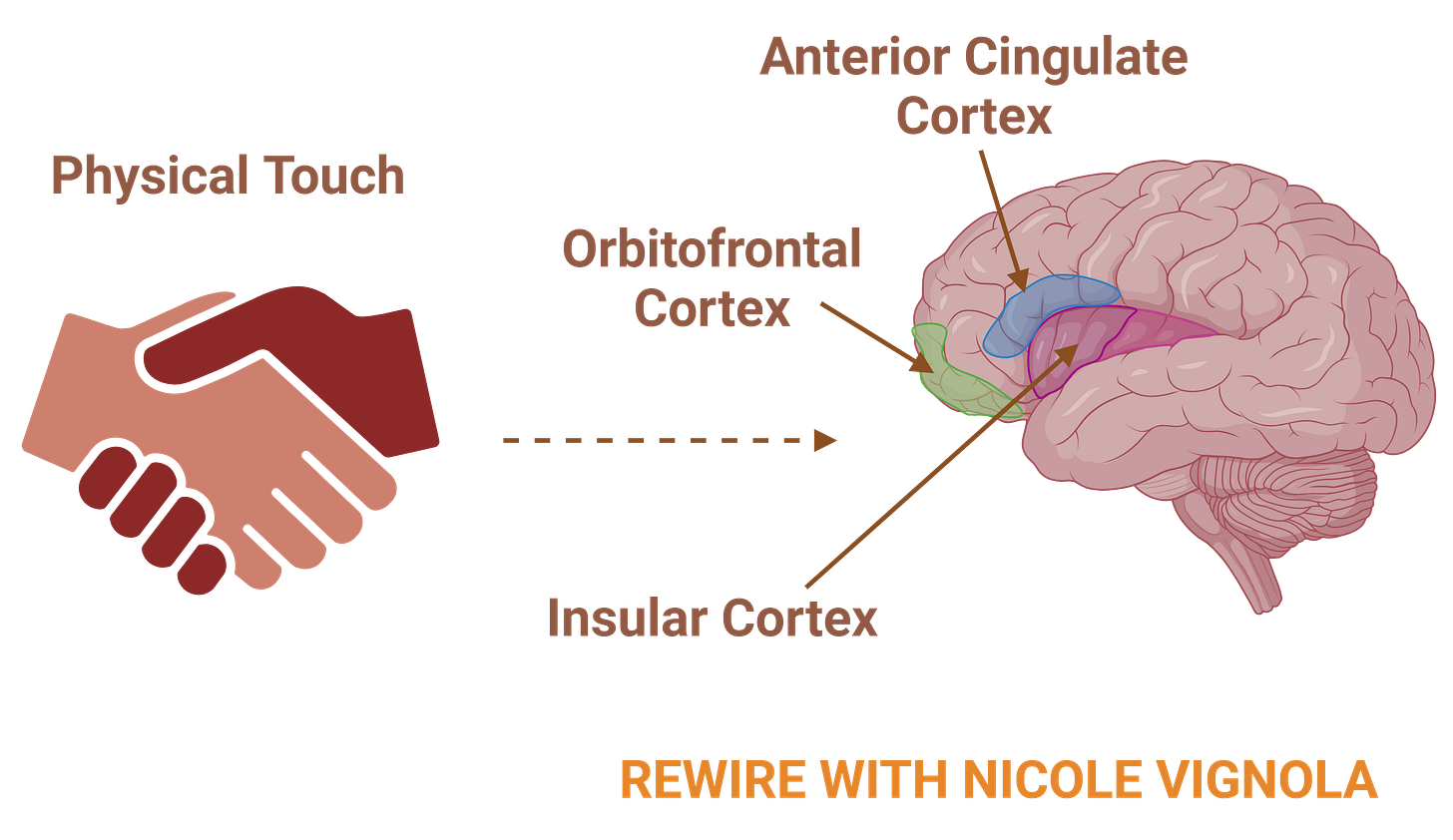Hey Brain Rewirers,
Welcome to this weeks newsletter! It’s the end of Sextober, so this week it’s all about sex.
Why should we care about sex?
Aside from sex feeling good, it’s actually important for our health, and the health of our relationship.
People engaging in more sexual activity had higher levels of IgA1, an antibody important in maintaining healthy immune function (low levels of IgA are associated with autoimmune diseases). Additionally, in men, it appeared that those engaging in more frequent sex had a reduced chance of a coronary event2. In general, sexual activity appears to have a protective effect on men's health3. Equally, we know that sexual satisfaction predicts relationship stability and satisfaction4.
And it isn’t just the physical act of sex that’s beneficial, but all the stages of intimacy leading up to it. For example, we know that for women, hugging a partner leads to reduced blood pressure and increased oxytocin5, the ‘love’ hormone (just a moment, and I’ll explain oxytocin in more detail). Kissing and hand holding can also lead to an increase in oxytocin, reduced cholestrol levels, and a perception of reduced stress6.
Oxytocin7
Oxytocin is a neuromodulator in the central nervous system. It is known for modulating our social behaviour, such as empathy, trust, belonging, and memory. One theory is that oxytocin reduces stress to help us engage in prosocial behaviour. It also creates a sense of empathy and trust to allow us to cooperate as a group. It interacts with our dopamine system, which probably helps us to remember which social encounters are beneficial and which aren’t.
Big picture: Oxytocin makes us feel good, reduces stress, and helps us bond and be social.
Are you uncomfortable yet?
With so many positive impacts of sex in our lives, why can’t we seem to talk about it?
A study conducted on newlyweds showed that they struggled to talk about sex8. Indeed, a survey commissioned by Durex found that a third of adults feel uncomfortable talking to their partner about sex9. And this directly translates to what the partners are then able to do to please each other. In one study, partners reported only knowing 62% of what their partners enjoy in bed, and 26% of what their partners don’t find pleasing10. Ironically, we know talking about sex with our partner is good for our satisfaction11.
There's a complex psychology to the awkwardness and reluctance we feel about sex, which stems from our childhood and early upbringing, religious beliefs, culture, fear, and probably a whole lot more. I won’t get into that here, but what I will say is this ‘taboo’ feeling around the topic affects how much research we can do on it, significantly limiting our ability to understand it12.
Physical Touch
Affectionate touch causes activation in the insula13, orbitofrontal cortex14, and anterior cingulate cortex15. The insula contributes to a lot of different brain functions, but is especially important in processing sensory information. Similarly, the orbitofrontal cortex has many roles but is a key player in rewards, pleasures, and emotions. Finally, the anterior cingulate cortex is important in decision-making and emotional regulation. As you can see, the brain's reaction to physical intimacy is not simple or singular.
Orgasm
The brain’s reaction to orgasm appears different in men and women, and frankly is fascinating16. Even more fascinating is the psychology behind what our brains lead up to orgasm.
In a 2005 study17, women who were struggling with their desire for sex and ability to orgasm after surgical removal of their ovaries were given a testosterone patch. The idea was that ovaries produce testosterone, an important hormone for sexual function, so perhaps replacing that testosterone would help. And after 12 weeks, it did! The women were having more sex with their partners, and finally able to orgasm. Except, for some women, there was no testosterone in the patch. It was a placebo. So, what changed?
Well, as part of the study, the women were required to talk about their sex lives and their sexual desires. We know imagery of sex can stimulate women's arousal, so it is thought that the change of environment and the requirement to talk about sex improved arousal and sexual function! We know that in women with reduced libido, there's also reduced activation of the entorhinal18 cortex, which allows us to retrieve positive emotional memories. So, the desire for sexual experiences in women is likely generated by the memory of previous positive experiences.
Now onto the orgasm.

We generally think of orgasm as the peak of arousal, but what’s interesting is a heightened state of arousal alone cannot bring us to orgasm. Yes, in men we see an astounding activation of the ventral tegmental area, i.e. the hub of our reward centre, the entorhinal cortex, for memory-based images, and the cerebellum, known for motor behaviour and more recently for emotional processing, BUT we also see a decline in activation of the amygdala, important for vigilance16.
For women, which areas are involved seems to depend on how the orgasm is generated. From clitoral stimulation, a woman’s brain goes silent upon orgasm. The orbitofrontal cortex, in charge of self-control, is mute, the prefrontal cortex, important for reflection and judgement, is silent, and the amygdala is silent, as in men. However, if the orgasm is generated vaginally, the whole limbic system, including the amygdala, the hypothalamus (produced of oxytocin), and the nucleus accumbens, necessary for reward, is activated.
So, what do you know, we should all start talking about sex more!
Until Next Week,
Nicole x
P.S. Leave a comment with requests for future newsletters!
References





Wow, this is so interesting! Thank you for sharing, I’d love to hear more about the benefits of sex from a scientific point of view, like you shared here 😊
I love this article thanks for all of the insights